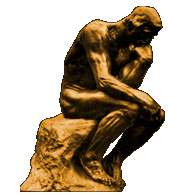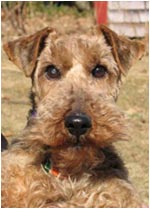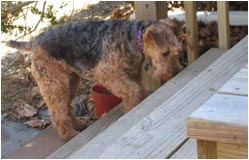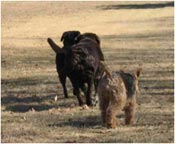|  For
the pet owner and anyone else who loves animals: For
the pet owner and anyone else who loves animals:
Many of my friends and family members own and love their pet cats and
dogs (and rats and turtles). Most of them seem to enjoy greatly talking
about their animal companions and reading stories about other people’s
pets. I’m sure that if you are similarly inclined you are aware
that many magazines, books, and websites offer reading materials that
will serve you far better than will my detailed abstract analysis of
animal cognition.
For the more inquisitive pet owner
who, for some reason, has become curious about the thinking processes
of his or her pet, many books are also available. The bibliographical
page on this website has my short reviews of many them. It appears that
the greatest difficulty in dealing with animal cognition lies in trying
to characterize animal thinking by interpreting carefully designed experiments
that tease out alternative ways of thinking about the issue rather than
by relying on a gut anthropomorphic interpretation. Because Marc Hauser,
a Professor at Harvard University, directly addresses this issue throughout
his book, Wild Minds, I suggest especially that you include his book
in your readings.
Finally, I suspect that there are a
few pet owners who have already read extensively about animal cognition
and feel that there are many issues that are poorly appreciated and
understood by both the amateurs and the professionals in the field.
Such people are likely to be aware that there is a great deal of disagreement
among people who study animal cognition and may be seeking some resolution
of these disagreements and misunderstandings. To these readers, I suggest
that my book may be an interesting and provocative read. It will at
least introduce a new way of conceptualizing animal thinking. My book
does not claim to have definitive answers to the questions that vex
this field. I instead offer hypotheses that have the potential to reshape
how we characterize animal cognition.
I'd Like to Introduce You to
Darryl
 |
Darryl is an eleven-year
old Welsh Terrier who lives in New England and has been blind from
a degenerative retinal disorder since about the age of 14 months. |
|
Here Darryl is climbing the
stairs of a house she visits a few times a year. She often uses
her head in tough situations like this—I mean she literally
bumps her head gently against the stairs and then climbs up. Darryl
bumps into trees and doors in the same way as she wanders about.
She has learned that it’s best not to run. |
 |
 |
Here we see Darryl following her friends BS
and Diva. Darryl patently walks after them. Like any dog, Darryl
likes to play, but if they knock against her or try to take something
she has, she threateningly growls and barks at them. You see,
Darryl doesn't know she's blind because nobody has ever told her.
She thinks, if you'll permit this momentary slip into anthropomorphism,
that's just the way the world is. You just naturally bump your
head into things, fall off steps, and get knocked over by other
barking things.
|
But Darryl doesn't think like you or me. She doesn't have words, and
she probably doesn't have images. Just what does she think, and more
importantly, how does she think? These are not easy questions but in
attempting to answer them in deep ways we can learn a lot—not
just about a brave blind dog, but about normally gifted animals, and
even something about ourselves.
Home I
Annotated Bibliography I For
Pet Owners I Thought You'd Never Ask
I Contact
|
Click
on the cover image for more information about the corresponding book.

Buy the Book...
Click on a vendor below to purchase
Amazon.com
Paperback
I Hardcover
Barnes & Noble
Paperback
I Hardcover
Books-A-Million
Paperback
I Hardcover

Buy the Book...
Click on a vendor below to purchase
Amazon.com
Paperback
I Hardcover
Barnes & Noble
Paperback
I Hardcover
Books-A-Million
Paperback
I Hardcover

Buy the Book...
Click on a vendor below to purchase
Amazon.com
Paperback
Barnes & Noble
Paperback
Books-A-Million
Paperback
|
 For
the pet owner and anyone else who loves animals:
For
the pet owner and anyone else who loves animals:




